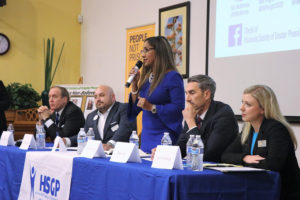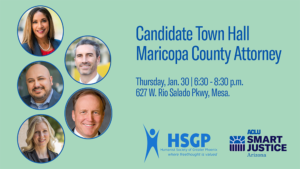Humanists Lead Local Candidate Forum
 Humanist Society of Greater Phoenix's candidate town hall for Maricopa County Attorney.
Humanist Society of Greater Phoenix's candidate town hall for Maricopa County Attorney. It’s 2020. Campaigning is in the air, and you can’t go outside without smelling partisanship. If you’re active in a humanist or other secular organization at the local level, chances are you’ve been asked what you can and can’t do in terms of the 2020 election.
Chances are also good that you, or someone in your humanist group, is active in the campaign world in addition to their secular activism. You see the resources, publicity, and influence that can come from stepping into the political arena. You’re also vaguely aware that a 501(c)3 can lose its nonprofit status for getting partisan, so if there’s any doubt, you might prefer to stay far away from the line.
As a professional humanist organizer and a licensed attorney, I think I can offer advice for any secular group that wants to engage in the political process without running afoul of nonprofit law. There are a number of ways that your 501(c)3 can make a splash in your community’s dialogue, not only without violating the law but actually using your non-partisan status to your advantage.
At the Humanist Society of Greater Phoenix, we hosted a candidate town hall for candidates running for Maricopa County Attorney. We had five of the six (all of the Democrats running) come and make their cases. We gave them all equal time, and they answered questions for a standing-room only audience. The forum made local news, aired on NPR, and brought publicity to secular issues that few people would have associated with a county attorney’s race.
 We also left an empty seat and name card out for the incumbent Republican, who declined to attend. For a nonpartisan organization that can’t support candidates, the framing of that absence probably speaks more than any endorsement could.
We also left an empty seat and name card out for the incumbent Republican, who declined to attend. For a nonpartisan organization that can’t support candidates, the framing of that absence probably speaks more than any endorsement could.
If you’re interested in tapping into the opportunities of hosting candidate forums, but you’re not sure what the laws are or where to start, here are some best practices both from my experience organizing them and my perspective as a nonprofit attorney:
1) In no way and under no circumstances can you be seen to endorse a candidate. This one is a legal mandate, and no matter how many headlines you read about the Trump administration not enforcing the Johnson Amendment, you will put your nonprofit status at risk if you violate it. It’s fine if most of your audience tends to vote in one direction over the other. It’s fine if the people involved in your organization are also involved in campaigns on their own time. You just need to choose someone who isn’t directly invested in the race to be your moderator.
The point of the forum is to establish your humanist group as a nonpartisan facilitator, a credible source of information in a partisan world.
2) Maximize candidate participation. This can be tricky when you’re up and coming as a humanist organization stepping into campaigns. It gets easier after you establish yourself as a host of candidate forums. To get started, I recommend reserving several different time slots in the distant enough future (two months is a good rule) to plan around candidate availability. Send the invitation to all the candidates, ask them to indicate their availability for as many time slots as possible, and tell all of them that the others have received the same invitation. This creates an incentive for the candidates to confirm their availability so they won’t be left out.
This is also a great time to consider which office to focus on. I recommend thinking local and, if possible, identifying competitive races. You’re not likely to start out with US Senate or gubernatorial candidates taking your organization seriously. You’re also not likely to be seen as making a serious impact if you’re looking at a race where the outcome is highly predictable.
Using our county attorney’s race as an example, electing the prosecutor in one of the largest law enforcement districts in the nation is no small matter, but it’s more achievable than, say, inviting Democratic senatorial candidate Mark Kelly and Senator Martha McSally (R-AZ) to debate at our humanist community center.
3) Find a good cosponsor—or several. We worked with the ACLU of Arizona to make our townhall event a success. Find an organization with established expertise on the issues relevant to the race if possible. Work with them to draft the agenda and refine the flow of the event. Then, when you have your event planned, invite as many organizations as possible to cosponsor and table at the venue. We hosted Black Lives Matter, Lucha, the Mass Liberation Project, the League of Women Voters, the Secular Coalition for Arizona, and a few others as cohosts to help us drive attendance and attract publicity. We even had volunteers there registering attendees to vote. If you don’t have volunteers in house who are qualified to register attendees to vote, consider getting a local partner that does. For example, we worked with the League of Women Voters, which is a nonpartisan nonprofit with a proven track record for voter registration.
Word of caution: we had the Maricopa County Democratic Party ask to table at the event, which of course we had to decline. We couldn’t give them table space, but that doesn’t mean they can’t be involved. They promoted the event independently and showed up in force to mingle with the crowd. I think it’s fair to say they saw the Humanist Society of Greater Phoenix (HSGP) as a force for progress in the community.
The important thing to remember is: never say or do anything that can be construed as an endorsement or denouncement of a candidate or political party. We didn’t reach out to the Democrats, but they did reach out to us. I told them we strictly prohibit all partisan fundraising but would allow partisan literature outside the event space and networking inside as long as those who participated did not purport to act on behalf of the Humanist Society. When the Democratic Party reached out to me, I knew we were legally safe because I applied the same rules I would have applied had the Republican Party reached out.
4) Elevate humanist issues. When you draft your agenda, give yourself a few lines to talk about humanism, press the candidates on separation of church and state, and paint your organization as a home for the activists and concerned community members who are attending for the first time. We succeeded in getting five of the six candidates for Maricopa County Attorney on record in support of separation of church and state.
Sometimes getting the support of your public servants is as simple as getting their attention before they’re in power.
5) Follow through, follow through, follow through. Take attendance, get names and email addresses, and follow up with your attendees promptly. We had the advantage of a sponsorship from Ben and Jerry’s where we gave coupons for free pints of ice cream to the first hundred people who signed up. Although this sponsorship was the ACLU’s doing, there are advantages to seeking sponsorships from socially conscious companies. A good sponsorship program starts with networking in the small business and solo practitioner communities and in members’ professional circles, and it comes to fruition when you can use their products or services to promote your events and mission. However, with or without free ice cream, your best chance of getting a new member is following up after someone gives one of your events a try.
Whatever the immediate results of the forum and no matter how small it feels compared to the scale of national politics, remember that while the never-ending cycle of campaigning isn’t temporary, any one campaign is. Every new generation of candidates that pops up on your community’s radar has to work within a landscape made up of non-temporary organizations.
My goal at HSGP is to be one of those institutions. Each cycle, we gain more prominence as local public servants come to see us as gatekeepers of community trust. We elevate the issues of church-state separation while inviting allies to elevate their issues as well. Eventually, candidates who a month ago had never heard of humanism realize that the humanist vote is something they have to woo and win.
If you’re serious about organizing a candidate forum or debate with your local humanist group, feel free to reach out and discuss. My email address is luke.douglas@hsgp.org, and I’m happy to help.
